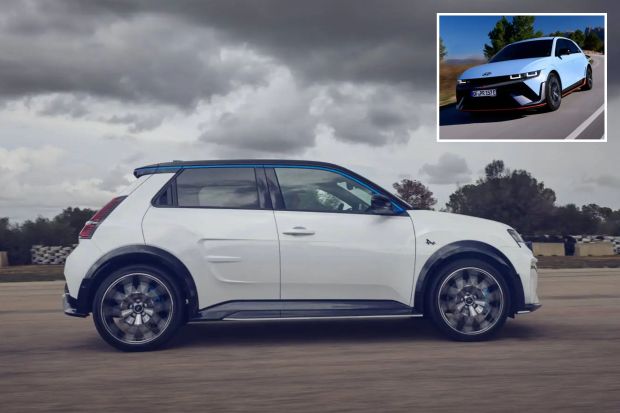Sports
Exciting Electric Vehicles Aim to Win Over Petrol Enthusiasts

The automotive industry is undergoing a significant transformation as manufacturers increasingly pivot towards electric vehicles (EVs). While the future appears electric, many car enthusiasts are hesitant to embrace this change. Experts highlight that the transition from petrol-powered cars to EVs presents unique challenges, despite government incentives designed to ease the switch.
In an interview with EVPowered, former Top Gear host James May urged car enthusiasts to explore the potential of electric power, suggesting, “If you’re a true car enthusiast, you have to take an interest in the future of the car.” Yet, the absence of familiar sensations, such as engine sounds and gear shifts associated with internal combustion engines, remains a significant barrier for many.
In a recent discussion with Sun Motors, Steve Walker, Head of Digital Content at Auto Express, outlined two primary challenges facing performance EVs. He noted that the weight of batteries makes it difficult for EVs to match the nimbleness and excitement of petrol cars. Additionally, car enthusiasts often feel a deep emotional connection to the legacy and heritage of traditional performance brands, which EVs disrupt.
“EVs are a real break from this past,” Walker explained. “They don’t have the same authenticity and don’t offer the same sounds and sensations that petrol cars do. This makes them less appealing initially.”
Despite these challenges, manufacturers recognize the importance of engaging car enthusiasts. These individuals are often willing to invest in premium and performance models, helping to cultivate a culture and interest around car brands. To address this, automakers are developing EVs that offer a more engaging driving experience. Features such as simulated engine sounds and artificial gear changes are starting to appear in performance EVs, designed to replicate the thrilling aspects of traditional petrol vehicles.
Looking to the future, advancements like lighter solid-state batteries and in-wheel electric motors could enhance driving dynamics, making EVs more attractive to enthusiasts.
Government Incentives Boost EV Adoption
A recent announcement regarding the Electric Car Grant adds another layer of appeal for potential buyers. The UK government has allocated £650 million to provide discounts of up to £3,750 for EVs priced under £37,000. This funding is expected to remain available until the end of the 2028-29 financial year, but it will only apply to models from manufacturers committed to a Science-Based Target (SBT) for emissions.
While fewer than 50 new EV models meet these criteria, several exciting options are available. The Alpine A290, starting at £33,000, along with the Abarth 600e, which boasts a base model with 237 horsepower, and the Mini JCW Electric with 255 horsepower, are among those eligible for the grant.
Walker commented on the appeal of current EV models, stating, “While performance car fans aren’t likely to be as excited about EVs as company car drivers or family buyers, there are a few current models that deserve to grab enthusiasts’ interest.” He pointed out the Hyundai Ioniq 5 N, which won the Auto Express Performance Car of the Year award in 2024, as a standout example of a fun electric vehicle.
Encouraging a Shift in Mindset
Transitioning from petrol to electric vehicles can be intimidating for many drivers. Walker emphasized the need for the industry to create EVs with emotional appeal, allowing drivers to express their personalities and passions as they have with traditional cars for decades.
“For enthusiasts making the switch, it’s important to recognise that EVs today are different beasts—heavier and quieter, with driving sensations that don’t replicate the petrol experience,” he stated. He noted that EVs provide immediate power delivery that many petrol models cannot match, and as technology evolves, these vehicles are expected to become more engaging and responsive.
Manufacturers will need to develop ‘halo’ cars to generate interest and showcase innovation. As legislation in Europe stands, these vehicles will likely have to be electric.
“Ultimately, without enthusiasts, cars risk becoming just another consumer product like a phone or washing machine,” Walker warned. The industry faces the challenge of ensuring that EVs resonate emotionally, similar to how petrol cars have done for generations.
With initiatives such as the Electric Car Grant and advancements in technology, the automotive landscape is poised for change. As manufacturers work to bridge the gap between tradition and innovation, the future of driving may hold exciting possibilities for both petrolheads and new enthusiasts alike.
-

 Entertainment3 months ago
Entertainment3 months agoAnn Ming Reflects on ITV’s ‘I Fought the Law’ Drama
-

 Entertainment4 months ago
Entertainment4 months agoKate Garraway Sells £2 Million Home Amid Financial Struggles
-

 Health3 months ago
Health3 months agoKatie Price Faces New Health Concerns After Cancer Symptoms Resurface
-

 Entertainment3 months ago
Entertainment3 months agoCoronation Street’s Carl Webster Faces Trouble with New Affairs
-

 Entertainment3 months ago
Entertainment3 months agoWhere is Tinder Swindler Simon Leviev? Latest Updates Revealed
-

 Entertainment4 months ago
Entertainment4 months agoMarkiplier Addresses AI Controversy During Livestream Response
-

 World2 weeks ago
World2 weeks agoBailey Announces Heartbreaking Split from Rebecca After Reunion
-

 Science1 month ago
Science1 month agoBrian Cox Addresses Claims of Alien Probe in 3I/ATLAS Discovery
-

 Entertainment2 weeks ago
Entertainment2 weeks agoCoronation Street Fans React as Todd Faces Heartbreaking Choice
-

 Health4 months ago
Health4 months agoCarol Vorderman Reflects on Health Scare and Family Support
-

 Entertainment4 months ago
Entertainment4 months agoKim Cattrall Posts Cryptic Message After HBO’s Sequel Cancellation
-

 Entertainment3 months ago
Entertainment3 months agoOlivia Attwood Opens Up About Fallout with Former Best Friend











